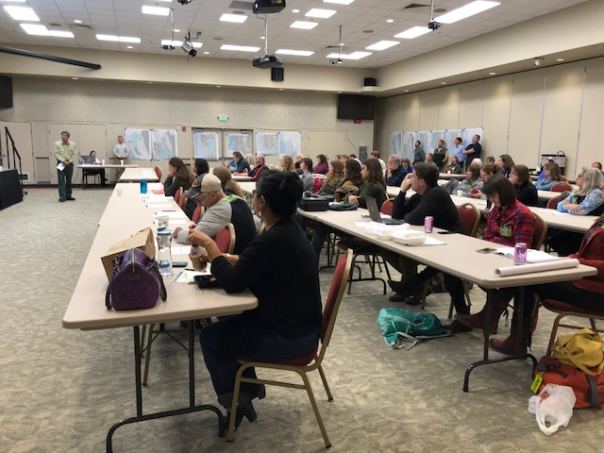
The U.S. Forest Service is on a tour through Southeast Alaska and Anchorage to talk about the prospect of building new roads in wilder parts of the Tongass National Forest. The controversial initiative, which was announced in August, is up against a November deadline. That’s when the state hopes to have a proposal ready for environmental analysis.
On Thursday, Sept. 13, the forest service held its first public meeting in Juneau.
The forest service wasn’t taking any formal public comment from the crowd of more than 50 people. Instead, there were maps stuck to walls with blue tape to spur discussion.
After some presentations from the forest service, the floor was opened up for a roughly 40-minute Q&A.
In 2016, a forest service plan for the Tongass included moving away from old growth logging.
It was created with years of community input from people on both sides of aisle, including conversation groups and the timber industry.
Meredith Trainor, the director of the Southeast Alaska Conservation Council, wondered how the possibility of new road building in the Tongass would alter previous plans like the one from 2016.
The prospect of new road building wasn’t on the table then. It’s not for most national forests in the United States.
Alaska has been fighting this for decades, and this latest attempt to green light new roads in the Tongass could potentially change that earlier management decision.
Some in the audience questioned whether that seemed like a good idea.
“It’s a guaranteed slippery slope,” Bart Koehler said. He says he pretty much came out of retirement to make that point.
Koehler used to work for the Southeast Alaska Conservation Council during the heyday of large scale industrial logging. During his career, he says he saw some positive changes in the way the Tongass was managed, the Roadless Rule being one of them.
Koehler says he’s upset with how the forest service is conducting its current reevaluation.
“This meeting format is a bunch of B.S. — just a pile of bear scat,” Koehler said. “You come, you’re interested and you want to say something and none of these conversations are being recorded.”
Koehler did get his questions in, though, and he’s going to submit a written comment by Oct. 15 when the deadline closes.
A lot of people attending the Juneau meeting wore green stickers that said, “Keep roadless in the Tongass.” Eric Nichols from Alcan Forest Products in Ketchikan wasn’t one of them.
“I’ve been up looking at timber in other places so Juneau was a stopover because of the plane schedule,” Nichols said.
Nichols acknowledged there didn’t seem to be much representation from industry in the room. But he says these issues extend beyond Juneau, to small communities where people are still employed by logging. It’s estimated there are few hundred timber jobs left.
However, Nichols doesn’t think that will be the case for long — if there isn’t easier access to trees.
“We’ve lost the balance. The balance is totally off the scale,” Nichols said. “We’ve got everything in protection for conversation, but very little for what’s going to generate economic activities.”
The next forest service meeting on road building in the Tongass will be in Ketchikan on Sep. 17. The governor’s office still needs to appoint an advisory committee to help inform the decision.




